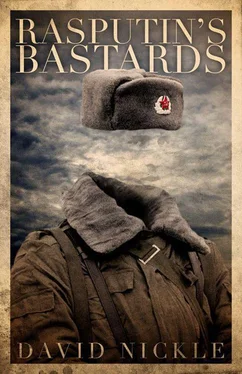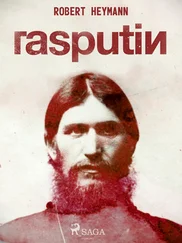So he settled himself against the trunk of one of the larger pines, his mittened hands stuffed between his legs for warmth — a chill wind was building from the west — and waited.
As he sat there, the wind began to grow. It stirred up eddies in the snow, that danced in golden swirls by his feet. Further south, the wind was more decisive; it scoured the surface grains of snow and drew them in a gossamer sheet between Alexei and the school buildings, Alexei and the sun. The gold seeped from the snow around him, leaving the faintest pink. And then the wind came to him. The snow stung at Alexei’s cheeks, and he shut his eyes against it. A shiver travelled up his back.
“ Kilodovich .” The voice was a whispering in his right ear.
Alexei started, opened his eyes and turned to see who spoke. There were only trees and swirling snow.
“Who is there?” he said.
The voice resumed in his left ear.
“ They are tricking you, Kilodovich. Like they tried to trick me .”
Alexei scrambled to his feet, his back pressed against the tree trunk. He looked from side to side in a panic. The snow squall had surrounded him in a bubble of white.
“Show yourself!” he shouted.
“ All right, Kilodovich. But not for long .”
And in the snow to the south, a shadow of a man resolved itself. He was tall and barrel-chested, with long hair that whipped to one side in the wind. He seemed to be completely naked. Alexei squinted, and a part of him that had been quiet for too long stepped forward to speak.
“Fyodor — Kolyokov?”
The apparition raised its immense hands and clapped them together twice. “ Very good ,” it said. “ Now we do not have much time, Kilodovich. You have been trapped in here by our cargo, and it is time for you to escape — to return to the true world. You have work to do on my behalf, and I want you to listen to my instructions very carefully. ”
“Return — to the true world?” said Alexei. “No. Not before I’ve laid the metaphor bare, and unravelled the lie of my life I don’t.”
“ What are you talking about ?” The apparition shuffled. “ No? You disobey me? Fuck. All right, listen carefully : Manka, Vasilissa, Baba Yaga. Now do as you’re told .”
Alexei felt a tugging at his middle, but the pressure was slight enough that he could ignore it. “What are you talking about?” he said. “I’ve got business here now.”
The apparition Kolyokov raised its fists and strode forward. Now Alexei could make out more details — and those details confused him more than ever. This was not the Fyodor Kolyokov he remembered: he was at least twenty years older and thirty pounds heavier for one thing — his hairline had peeled back from his forehead and now rested near the crown of his skull, catching its breath for the final ascent to the top — and in all Alexei’s memories of his old instructor, never had his eyes blazed with such raw fury as they did now.
“I have business here !” he bellowed. “ And you, Kilodovich, are a part of that business ! Manka! Vasilissa! Baba Yaga! Obey me! You are my tool! Step from the metaphor! Return to the Physick !”
“Ah,” said Alexei. “So it is a metaphor.”
“ Kilodovich! ”
“I remember you being here,” said Alexei. “Very distinctly. And not as an old ghost. But as a young man. Where are you?”
“ It is too much to explain ,” said the ghost, which was becoming flustered and dissolute. “ It — look—”
“I have to unravel this before I leave,” said Alexei. “You have convinced me of this.”
And with that, the winds died down, and the apparition of Fyodor Kolyokov fell into the cold ground along with the thin flakes of arctic snow. The school resolved itself in the distance. Nearer, little Ilyich Chenko ran towards him, his deck of cards clutched in a bare hand, the setting sun painting a bright halo around his shoulders. Alexei smiled.
“So Ilyich,” he said as his old friend came closer. “You are not dead after all.”
Ilyich grinned, breath puffing a vapourous beard across his young chin. “Not today,” he said. “I’ve still got to win back those rubles, eh, Kilodovich?”
“One last chance,” said Alexei, and sat down to enjoy the card game.
Two days later, midway through his trigonometry examination, Alexei made up his mind: enough was enough.
He put down his pencil and stood up. Czernochov was presiding over the exam, and he glared at Alexei, motioned for him to sit.
“No,” said Alexei. “Vladimir did not have trigonometry in mind when he sent me to this place.”
“Are you back on drugs, Kilodovich?” Not taking his eyes off Alexei, Czernochov reached behind him and grasped hold of his yardstick. It was of limited use for drawing lines or measuring, as Czernochov had long ago cracked it — beating suspected drug addicts who interrupted his lessons.
“I was never on drugs,” said Alexei. “You were never my instructor. It was always Fyodor Kolyokov. Why is he not here? Because this is not true.”
Czernochov sneered, and opened his mouth to speak. But nothing came out. The windows grew lighter and the shadows shifted as the sun began, impossibly, to move higher into the sky.
And with that, the world of Alexei’s trigonometry exam began to fragment and fade.
Alexei now stood in a setting that was more familiar — even though he had not truly recalled being there for twenty years. This was an examination room, but it was a real examination room: a small room with shiny painted cinderblock walls with high, frosted-glass windows and a single flickering fluorescent tube providing all the light. He was alone.
“What are the colours I am thinking of?”
The voice came from a speaker somewhere near the ceiling.
“Red. Black. A sort of green.”
“‘A sort of green.’ Can you be more specific, Kilodovich?”
“There is blue in it. So it’s not completely green.” Alexei concentrated on the colour he was seeing behind his eyes. It reminded him of the surface of the ocean, near a port; on a grey day, with seagulls crying in the air, and bobbing in the water, a nautical buoy — shaped like an oilcan, with a black metal latticework supporting a blinking red light. The buoy was numbered, and something was written on the side. In Spanish?
“We are near Cuba.”
The speaker was silent. Alexei concentrated.
“Okay. I see a boat approaching. It’s a motor launch, pretty small, with what looks like three American college students in it. In fact, though, none of them go to college. The pilot is a man named Harvey Abelson. He’s CIA. He’s thirty-two but looks eighteen, He has two others with him who are also operatives: a woman named Ruth Etterby and a man, Fred Winslow. They’re watching for a particular boat, coming from Cuba.”
“I see. And who — who is in that boat?”
Alexei thought about that. Abelson knew a name — Emilio Torres — and he knew a face — a thin, bald man with a long black beard and a patch of nearly white skin in front of his left ear, where a burn had healed badly.
But Alexei didn’t think that was right. He concentrated further, and finally said: “One of ours. Abelson doesn’t know it, though.”
There was a staticky shuffling at the microphone, and a woman’s voice spoke next.
“How do you know it, then, Kilodovich?”
“He is nervous, our man. His thoughts are like a horn across the water.”
“Spare us the similes. Keep watching. Tell us when he arrives.”
Alexei waited. He cast his eye across the water, dwelled on a growing mass of thunderheads to the east, white and grey against a stratospheric blue. The ocean had a smell to it, too — one that he, who had never been near a large body of water, had no words for. An alien smell. Alexei let his attention return to the Americans.
Читать дальше












